Reviews
Spirits of the Dead / Histoires extraordinaires
Louis Malle
France / Italy, 1968
Credits
Review by Jonathan Foltz
Posted on 23 November 2010
Source DivX
Categories Malle Entendu: The Ecstatic, Eclectic Cinema of Louis Malle
We stand upon the brink of a precipice. We peer into the abyss—we grow sick and dizzy. Our first impulse is to shrink from danger. Unaccountably we remain. By slow degrees our sickness, and dizziness, and horror, become merged in a cloud of unnameable feeling…. It is merely the idea of what would be our sensations during the sweeping precipitancy of a fall from such a height. And this fall - this rushing annihilation - for the very reason that it involves that one most ghastly and loathsome of all the most ghastly and loathsome images of death and suffering which have ever presented themselves to our imagination—for this very cause do we now the most vividly desire it.
—Edgar Allan Poe, “The Imp of the Perverse”
According to an interview with Philip French, aspects of Louis Malle’s adaptation of Poe’s short story “William Wilson” - his contribution to the 1968 Poe omnibus film, Spirits of the Dead - were based on the director’s own memories of childhood. While narratives of adolescence are frequent hallmarks of Malle’s cinema, readers familiar with Poe’s allegory of the horrific dissolution of identity will detect in this “autobiographical” gesture a dimension of deep ambivalence or even perversity. At a creative impasse after 1967’s Le Voleur, and on the brink of his brief escape to India, Malle used William Wilson to explore the shortcomings of commercial filmmaking with almost self-destructive directness. “I was in a very strange mood,” Malle remarked of the production, “dark, very dark, suicidal.”1 Considering that William Wilson is also a narrative of personal fatality and moral turpitude, it is hard not to read Malle’s take on Poe’s story as a self-reflexive comment on his own creative exhaustion.
Although Malle’s contribution to Spirits of the Dead habitually receives less attention than Fellini’s visionary and decidedly loose adaptation of “Never Bet the Devil Your Head” - which turns the spectacle of celebrity culture into a psychedelic tale of the death drive - it is also worth considering how William Wilson uses (and abuses) its iconic stars in order to think about the violence and cruelty implicit in the act of viewing. Malle was apparently forced to cast both the difficult Alain Delon (who had presented him the project) and the bankable Brigitte Bardot as the film’s leads, and he expresses a silent resentment in part by the way he defaces his stars, giving Bardot an achingly artificial black wig and making Delon’s character generally as unappealing as possible. The titular William Wilson of Poe’s story is not exactly a likeable character, but the evidence of his profligacy barely stretches beyond drunkenness, gambling and the unpleasant habit of gazing at people while they sleep. For Poe, the horror of the story is uniquely metaphysical, arising from Wilson’s encounters with a doppelganger (with the same appearance, name, and birthday), whose very existence calls into question the protagonist’s cherished sense of singularity.
Malle, however, enlarges graphically upon the scenes of vice implied by Poe’s story: a childhood Wilson exacts revenge on a student by stripping him of his clothes and dangling him precariously over a pit of rats; as a medical student, he grabs a woman from the street, ties her to the examining table in a lecture room, and (presumably before raping her) practices his knowledge of heart surgery on her exposed body with a scalpel; and, as a soldier, he mercilessly whips a woman, played Bardot, whom he (unfairly) beats at cards. In each of these instances, Wilson’s doppelganger arrives to put a stop to these indecencies, bringing abrupt relief for the audience. By placing such added emphasis on the cruelty of Wilson’s character, Malle reads Poe through the lens of Sade as a way of distancing us from the sociopathic Wilson (Delon emerges from the film seeming as creepy as Udo Kier). And yet, because Malle interrupts Wilson’s misdeeds before they are actually consummated, our sense of relief is tinged with the dark understanding that we had already completed these actions in imagination. In fact, throughout the film, Wilson - who, as one woman rebukes in the film, “needs an audience” in order to perform sexually - uncomfortably demonstrates the sense in which the act of watching reinforces onscreen cruelty, which Malle suggests we secretly desire.
The film is told retrospectively through flashbacks as a guilt-ridden Wilson confesses his story to an incredulous priest. In this way, Malle attempts to resolve one of the contradictions in Poe’s tale (whose narrator impossibly dies at the end of the story he is relating), while ostensibly giving the story a moral center. But the religious frame of the film cannot fully eradicate our sense of unease. The priest does not believe the “extraordinary story” Wilson tells, and the church, far from a site of redemption, becomes the stage of Wilson’s suicide—or rather for one of two suicides. The hero of Poe’s story dies upon stabbing his avenging double, a scene which poses the murder as a kind of displaced suicide. In the film, however, Wilson stabs his double at the end of climactic fencing duel only to run straight to the church, confess his story to the priest (and audience) and then jump off of the bell tower. When his body is discovered, it has a knife buried in the stomach, lodged in the same area where Wilson had stabbed his double. In other words, the film attempts to maintain the “mystical” symbolic symmetry of Wilson’s death, while also providing a detour of narrative concession that explains everything in rational terms. In adding this little wrinkle in time, the film casts a certain absurdity over Wilson’s death, making it seem an arbitrary narrative device rather than the inexorable expression of fatality it is in Poe’s story.
And yet, if Malle’s adaptation (especially its ending) highlights the clunkiness of narrative economy in a film about creative fatigue, William Wilson is not entirely devoid of directorial flourish. Easily the most kinetic moments in the film come in its opening sequence, which shows Wilson running frantically through the streets towards the church where he will deliver his confession. Malle cuts repetitively, and without a sense of continuity, to different shots of Delon’s face (slashed prominently, as we will later discover, in his fencing match), interspersing these shots with images of a body (later shown to be Wilson himself) falling from the church belltower. In this way, Malle uses the violence of editing to foreshadow Wilson’s own violence. Malle’s “cutting” doubles for Wilson’s penchant for lacerating women, explored later in the film, posing the defacement of Delon’s slashed forehead (by the editing knife or fencing blade) as a kind of dual metaphor for both Malle’s strained relation to his star actor and the pathological sadism implicit in filmmaking. It’s a dizzying opening that takes on added complexity as the film progresses. As Wilson arrives at the church, he glances quickly at a man tolling the bell who begins to tremble, revealing his hands covered in small cuts, similar to those Wilson incurs while being punished in school (a scene shown in a subsequent flashback). The audience has no context for these images when the film starts, but Malle uses the sequence to craft a delirious opening hymn to the irrationality and originlessness of pain that is uniquely appropriate to the spirit, if not the letter of Poe’s story. While William Wilson finds Malle confronting his dissatisfaction with cinematic norms in a strangely backward-looking format (especially on the eve of the May ‘68 upheavals), the film gives evidence of creative restlessness as well as lassitude, signaling that a stylistic change would soon be coming.
- Quoted in Hugo Frey, _Louis Malle_ (Manchester, UK: Manchester University Press, 2004), 80.↩
More Malle Entendu: The Ecstatic, Eclectic Cinema of Louis Malle
-
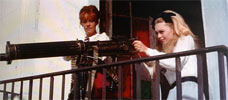
Viva Maria!
1965 -
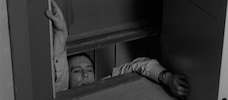
Elevator to the Gallows
1957 -

Zazie dans le métro
1960 -
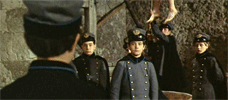
William Wilson
1968 -
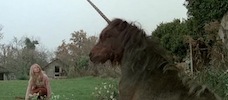
Black Moon
1975 -
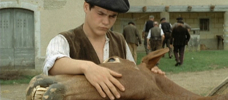
Lacombe, Lucien
1974 -

Atlantic City
1980 -
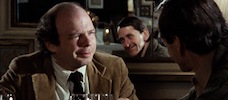
My Dinner with Andre
1981 -
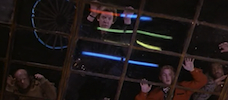
Crackers
1984 -
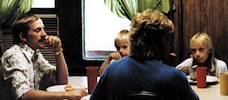
God’s Country
1985 -

Vanya on 42nd Street
1994
We don’t do comments anymore, but you may contact us here or find us on Twitter or Facebook.



